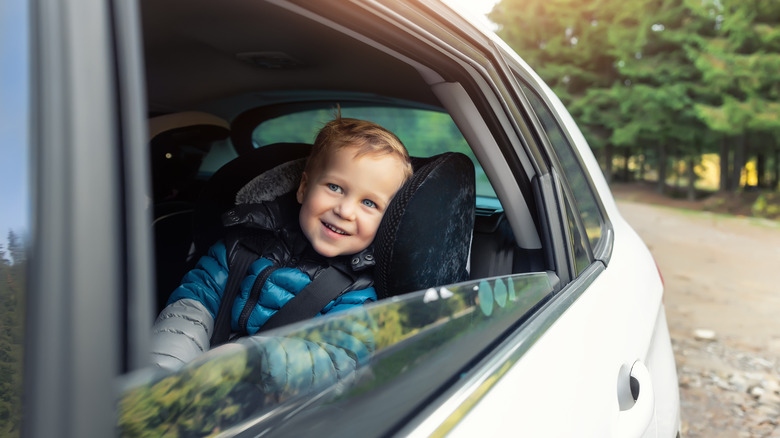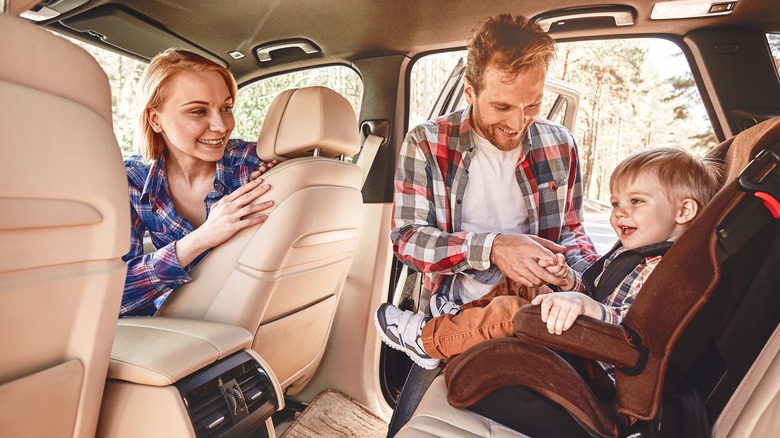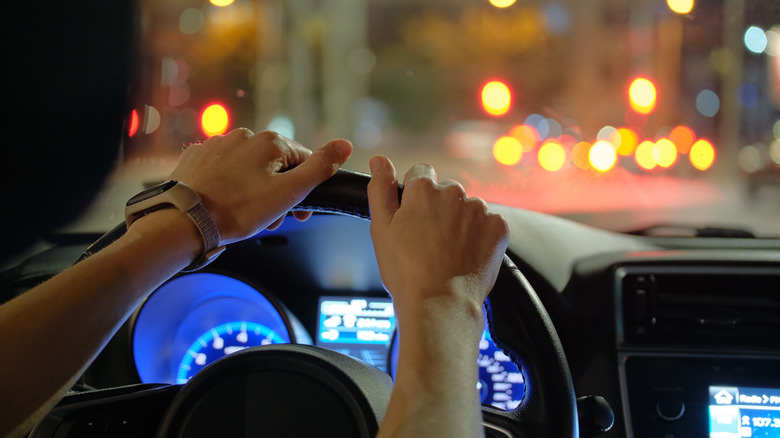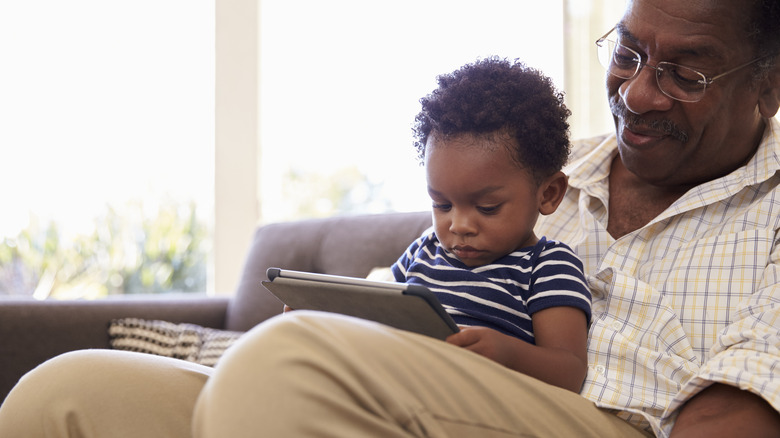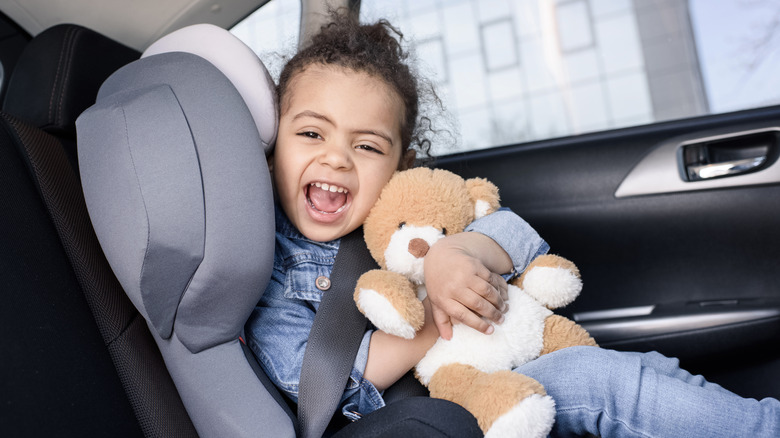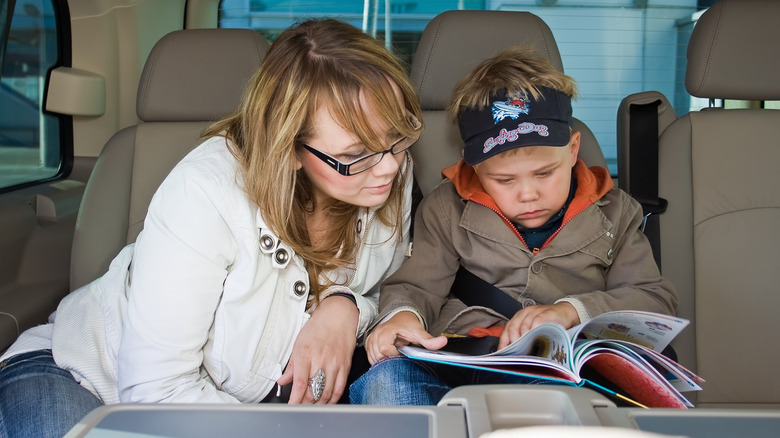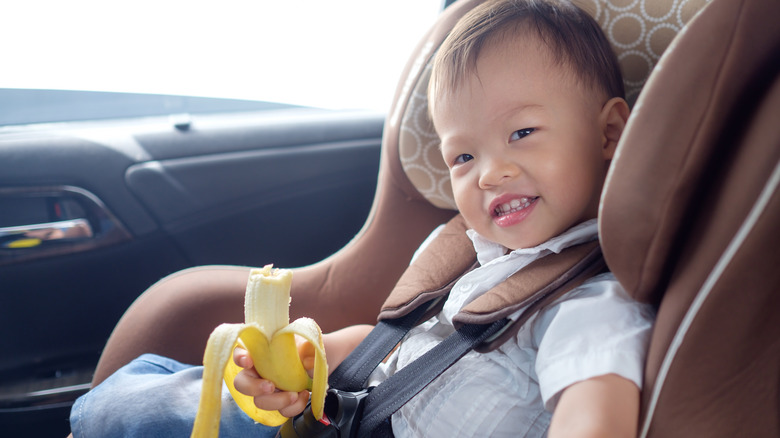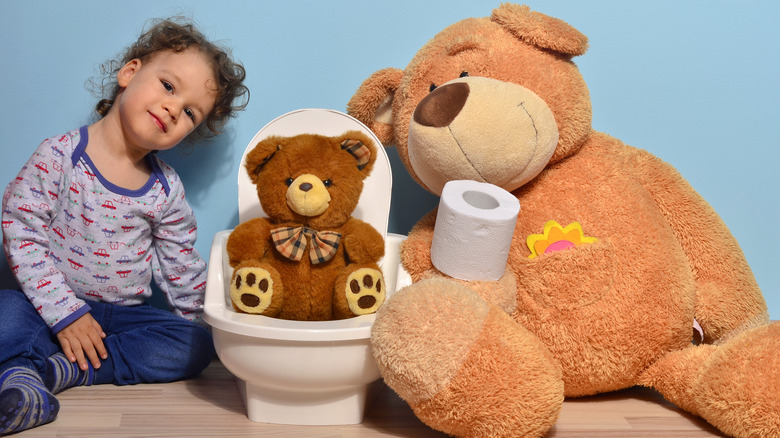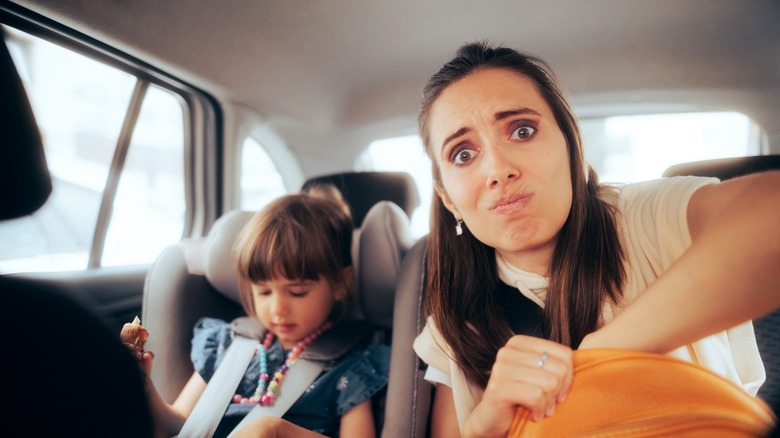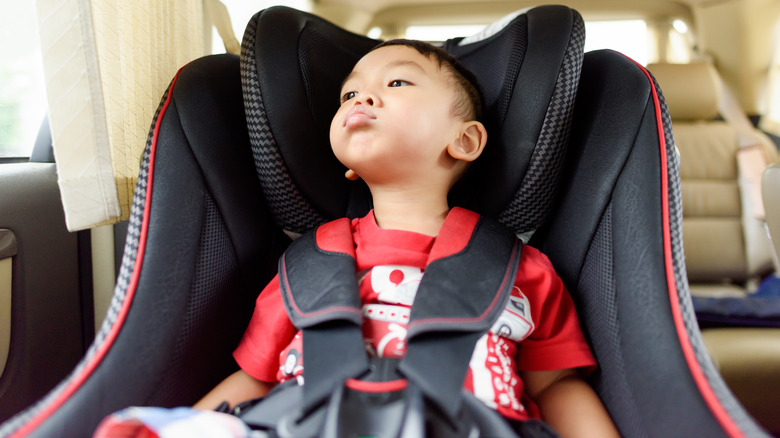Tips For Road-Tripping With Your Toddler
Traveling with children can be a beautiful experience, though it does come with a fair share of stress. No matter how young, children who travel with their parents or caregivers receive many benefits when they are exposed to new environments and ways of life. If you're planning to travel with a toddler there are a number of reasons you may choose to drive rather than take another means of transport — road-tripping is a great option, albeit a brave one. For one thing, having a car on hand is a bonus, as is the lack of having to tote around a car seat on a plane and along the entire journey.
Planning out and starting on a road trip with a newborn or young child in tow, however, is a pretty hefty venture — and a road trip with a toddler has many added complications that a solo or adults-only road trip doesn't have. Not to worry — we have some solid tips for road-tripping with your toddler that will make the long drive not only doable, but also a fun and memorable experience you can look back on for years to come. From timing your journey right to packing all the essential items, every angle of your trip can be fit to better accommodate your most precious cargo.
And so, here are a bunch of excellent tips when traveling on the road with your toddler.
Don't go at it alone
Traveling with toddlers is hard, especially since young children are not able to fully understand and are unable to regulate and process their own feelings and emotions. Taking a road trip with a toddler alone and making that same drive with a partner are two wildly different trips — the addition of another person to help along the way being beneficial in a number of ways.
Having a travel partner, if possible, is the first tip on this list because it might be the one that makes the most difference. While the list is full of tips that will help accommodate the lack of emotional intelligence young children face, sharing the load of caregiver during what can be a high-stress trip is really a great way to help ensure your toddler receives the attention they need and desire.
Traveling with another adult has loads of benefits, a lot of which are transferable when your toddler is along for the ride as well. You'll have someone to help care for the toddler, potentially sitting in the backseat to entertain during waking hours and monitoring them while your little one is eating or sleeping. Additionally, an added presence can be beneficial in the lasting effect of a trip, helping to take pictures and document the important memories as well as being someone to talk to about all your experiences while traveling. Though, according to Fatherly, your toddler may remember parts of your vacation!
Consider traveling at night
The chances of your road trip going smoothly without much fuss from your little one is significantly improved if you can travel while they are asleep. Leaving around their bedtime — for most people, this is at night — may help them sleep through a good portion of the trip. Other benefits of traveling at night with your little one is that you have a higher chance of their sleep schedule not being disrupted too much. When a young child's sleep schedule gets thrown out of whack, it can take a couple days to get back to their routine.
Another great option would be to wake your toddler a few hours early and hit the road in the early morning while it is still dark out. This way, you start with a sleepy, yet curious child that might stay awake and content for an hour or two and fall asleep well into the trip. If you're lucky, this early rise will create a lengthy early nap.
If you've never traveled at night with your child and don't know how they'd react to the dark of the car, take a test run within the week before the trip or bring a battery-powered light for the backseat. Also, it's important to note that while incorporating sleep into your toddler's travel schedule is important, it's also risky. If the babe is too uncomfortable or unwilling to sleep in the car seat, you could end up with an extra-cranky, over-tired tiny human.
Plan plenty of stops
Road tripping with a baby requires you to stop pretty frequently, even if the infant is asleep. When traveling with a toddler, though, you have a little more freedom with your stops. You should still be stopping relatively often to get some movement and fresh air — planning strategic stops along the way will help break up the trip so that your toddler doesn't get too bored and is able to stretch their little legs.
It's easier to distract a toddler than it is an infant, so it is much easier to rely on specific stops. Since toddlers are more active in both their movements and their learning, planning more elaborate stops is possible. Stretching a trip's ETA when traveling with a young child can be a great idea, because incorporating stimulating stops along the way is worth the extra mileage. Driving through a city with a children's museum, for example, instead of taking a route around can provide a lengthy break from the car that's much more than just walking around a rest stop.
By using tools like Google Maps and My Maps, you can plan out your whole trips with stops along the way that are geared toward young children. Finding toddler-friendly stops is more difficult than attractions for older kids, but you should be able to locate enough for a couple stops along the way by doing a little research about the areas you will be passing through.
Be mindful of screen time
Most professionals will tell you that screen time for little ones should be limited, or even non-existent. According to the Mayo Clinic, screen time should not exceed an hour for children aged two to five. This may not be possible for some parents for a number of reasons and there may be some acceptable exceptions to the rule. Road tripping with a toddler is a pretty good exception, as they are going to be stuck in a seat with not much to stimulate their brain anyway.
Handing your little one a tablet for part of your trip is a great way to keep them entertained and is a great distraction from fussiness — this tip works especially well if your toddler does not get a ton of screen time at home and it is treated as a "special occasion" tool. The vast majority of people do not have wifi or hotspots in the car, so knowing how to stock your child's device could take a little bit of planning.
The Amazon App is a great option for parents who have already purchased content for their toddler, as it allows users to download owned content to a device — and there are plenty of educational programs available. No matter what you use, though, having a library of content for your toddler to choose from can be very helpful for entertainment on a long journey.
Pack a special travel play pack
While you should be careful about the objects you give to a small child when they are in their car seat, packing some special toys and activities is a great idea that will keep your toddler from getting bored and stimulate their mind while they are stuck in a car seat. In order to pick car safe toys and games for your toddler you'll have to consider all the things that could potentially make a toy dangerous for travel (via The Car Seat Lady).
It's important to note that in an accident, everything has the potential to become a projectile. Hard, sharp toys should be avoided in case of abrupt stops, accidents, or quick turns. Toys that are smaller than guidelines for kids' toy safety or have many small parts should definitely be avoided, as well as toys with long strings or toys that are supposed to be tied to something — you should never attach a toy or anything else to a car seat.
If you choose to make a travel pack for your toddler, use either new toys or toys that they have not played with in a while. The newness and novelty of these items (to discover and learn from) will entertain your child much more adequately than the same toys they are used to playing with at home.
Become a storyteller
Toddlers crave attention, it's how they learn and build bonds with the people closest to them. During a road trip, it's entirely possible to meet this need — albeit, much harder than if in a comfortable and more routine environment. One of the first things people come to recognize in life is the voice of their mother, so using your voice and speaking to your toddler from the front seat is an easy way to promote learning in the car as well as establish your continued presence and provide comfort. It doesn't really matter what you're saying to your toddler as much as the fact that you are speaking and making noise so that they can hear you and interact.
Telling stories has a lot of benefits and is a great addition to a road trip. One of the great things about children is that they are quite literally a blank slate, and the stories you have grown up on are completely foreign to them — the large chunk of time spent in the car on a road trip is a great time to hand those stories down to your kids. Narrating your day, what you are doing, and your plans for the trip are also great ways to keep your presence established and distract them from the boring car while also increasing their communication skills.
Play vocal games with your toddler
Using your voice and talking to your child while in the car is so important that it's on this list twice. Especially if you are traveling with your toddler alone, singing and playing vocal games from the front seat is almost a necessity. Toddlers are curious, especially when presented with new situations and need to know what is going on and where their person is — if they don't hear conversation from the front seat between others, they'll need to hear you at least every once in a while.
Toddlers are also like sponges, and they learn well audibly. Singing songs is a great way for them to learn, strengthen their memory, and increase their vocabulary and sound pronunciation. The ABCs is a great song to sing in the car to your toddler — it sets a foundation for reading and is something they will use frequently throughout their life. Don't be surprised if your toddler starts memorizing songs and asks for an encore from time to time!
While most car games you probably remember playing are geared for older children, there is typically a simplified version for toddlers you can implement on a road trip. For example, I Spy can change from a scavenger-hunt type game to simply calling out all the obvious things you can see and their colors.
Bring travel safe snacks
Similar to sleeping in the car seat or having screen time, it's not great to make a habit out of eating in a car seat (via The Car Seat Lady). However, an exception can be made for road tripping with a little one if you are careful and take some precautions. When looking for car seat safe snacks, you want things that do not pose much of a choking risk and don't have a lot of messy characteristics. Bananas, pretzels, and dry cereal are great options, but there are countless snacks that could be suitable depending on your own comfort level.
You will still need to monitor your toddler while eating — if you are traveling with a partner it's a great idea for them to sit in the back while the toddler has food available to them. If you're traveling solo besides your little one, though, talking to your toddler and making sure they respond or using a backseat mirror may be helpful techniques.
It's important to remember that toddlers are messy and while traveling you will likely not have access to the same accommodations you have at home. This means that if your toddler spills juice or smears yogurt all over their car seat, it won't be nearly as quick or simple of a fix than it would be at home. It's best to air on the safe side and give them the least wet, messy snacks as possible.
Have the element of surprise on your side
Taking special toys and snacks on the road is a great idea, and an even greater one is to hide them until they are needed. Keep these things out of sight while packing and in the car — that way (once your toddler starts getting restless) you can offer him a toy or snack as a surprise rather than something they already suspect is available to them.
The less your child knows about your plans to keep the road trip fun for them and fuss-free, the better. This will not only help to spread out the treats, but also give your toddler a little extra excitement in seeing them and being offered something special. This also goes for any stops or excursions you have planned along the route. The last thing you want to do is hype up an activity you have planned just to later realize it no longer fits into your schedule due to unplanned stops or an unexpected nap.
According to cognitive psychologists Aimee E. Stahl and Lisa Feigenson, surprises can also be mentally stimulating and supportive of learning (via ScienceDaily). Being presented with something new and unexpected helps a young child learn about the complex world they have been thrust into, and luckily for parents attempting to roadtrip with them, surprises hold toddlers' attention pretty well.
Know your sleeping arrangements
Unless you are taking a relatively short road trip, chances are you will need to stay at least one night somewhere. Traveling with a toddler will make travel time longer and children can only go so long in the car a day, so you may just need to hang it up for the night even if you didn't have an overnight stay already planned along your route.
If you co-sleep with your child, booking a king sized bed in a hotel is a good option. The larger bed offers plenty of space and makes up for not being able to push it against the wall if you have that arrangement at home. Since your child will have the familiar comfort of sleeping next to you, the change in setting shouldn't affect their sleep too much.
However, if your little one needs their own sleep space, sharing a hotel room with your toddler can pose some challenges — but you do have a few options. This is where planning comes in handy, as you can likely request special accommodations for your toddler if they are available. Some hotels offer cribs or extra sleeping arrangements if you ask, and these can be brought into the room by staff. If a hotel has a suite with a pullout couch, that could be a decent option for an extra sleep space as well. Alternatively, you can bring your own sleep accommodations, like a Pack 'n Play.
The potty situation
If your toddler is in the middle of potty training, your road trip has another huge complication that needs to be considered thoroughly — how to travel while not interrupting progress. All children are different and potty train at different times, speeds, and fashions. There are certainly ways to make potty training while traveling easier, but you will have to take into account your child's cues and how they have been learning so far.
If your child is able to tell you when they need to use the bathroom, continuing the training process may be as simple as finding a rest stop as soon as they let you know. It is common, though, that a child will need to immediately use the restroom after verbalizing the need, which would require a very quick stop when there may not be one available. In cases like these and cases in which a toddler will only sit on their own potty, it is useful to set up a potty station in the car. This would usually be in the trunk area of an SUV or bigger car, where a toddler potty is set up along with all the necessities.
Another method of keeping your toddler on-the-road to fully potty trained is to stop very frequently — every 30 or so minutes — and offer the potty. Regardless of the method, you should teach them to use a full sized potty and start potty training at least a week in advance of the trip.
Expect set-backs
Your plans will most likely change while traveling with a toddler. If you plan for four stops, expect to add a couple. Whether it be because they insisted they had to use the potty every 10 minutes or they're overtired from a thrown off sleep schedule, you can pretty much throw your estimated time of arrival out the window when you travel with small children. They require more care, especially when thrown into new situations like traveling for extended periods, and in turn they require more flexibility.
Traveling mom Sabina of Mom Van Up recommends a cap of six hours of drive time a day when traveling with children, as they really can't handle being cooped up in a car seat for longer, and this is spread throughout the day or night with stops. If you consider these stops, the six hours turns into quite a bit longer, which means the driver(s) will most likely be begging for an extended break from the car as well.
For travelers on a budget where the added expense of another travel day and hotel stay may not be in the cards, there are plenty of shorter road trips worth taking. Of course, the length and destination of a road trip would highly depend on your starting location, but researching destinations that are closer to you will decrease the likelihood that you will experience major setbacks and the need to stay somewhere overnight.
Roll with the punches
Traveling can certainly be stressful, but it shouldn't be. Taking a trip should bring you peace and loving memories, especially when you are taking along the most important people in your life. Driving long distances with a toddler is going to come with plenty of added potential for stress — rolling along with possible tantrums and setbacks will not only elevate your own stress level, but your toddler's as well. Toddlers are tuned to the people they love the most, and they can sense your tension – while that sounds like a kind of superpower, it can be detrimental to their mental health and development. So take a deep breath, make a pitstop to hold that babe, and continue on your way once everyone is in a better mood.
There is a 90-second rule concerning the brain and its response to stress and high-intensity emotion, according to neuroanatomist Dr. Jill Bolte Taylor (via Courage to Caregivers). The rule basically states that it takes a minute and a half for the brain to fully process an emotion, meaning that taking that 90 seconds to work through your frustration or stress will help alleviate it. As natural as it is to want to solve a perceived problem or emotion as fast as possible when caring for a tiny human who doesn't understand your frustrations, taking a step back for a couple minutes could greatly improve your ability to roll with the punches.
